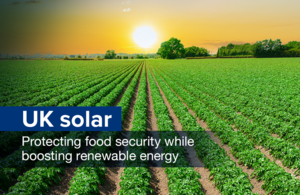Solar projects must fit in with food security
Energy Security Secretary has told Parliament that with growing geopolitical tension, the best agricultural land must be protected for food security.

- Energy Security Secretary has told Parliament that with growing geopolitical tension, the best agricultural land must be protected for food security
- solar will continue to play a key part in government’s plans for energy security and net zero, with suitable brownfield areas of lower quality land and rooftops prioritised as locations
- government stresses that planning authorities must consider cumulative impacts where several proposals for solar projects come forward in the same area
The best agricultural land should be prioritised for food production – Energy Security Secretary Claire Coutinho told Parliament today (Wednesday 15 May).
As the Prime Minister set out earlier this week, in the face of heightened global instability, the government is taking steps to strengthen food security as part of the UK’s national resilience.
That includes protecting ‘Best and Most Versatile’ (BMV) land, ensuring large solar projects avoid this higher quality land where possible. Instead, they should be developed on brownfield land, contaminated land, industrial land, and lower quality agricultural land so as not to compromise the UK’s food security.
Solar power will continue to play an important role in delivering cleaner, cheaper and more secure energy – with a more than 4-fold increase in solar deployment expected by 2035, up to 70GW.
To reach that goal, the Energy Security Secretary has reinforced the weight of planning policy and the need for solar to be delivered in a sensible way – ensuring developers and planning authorities consider the cumulative impact solar projects can have on local communities, especially where they are facing a high volume of applications.
She also announced plans to expand the Renewable Energy Planning Database to include up-to-date data on the type of land used by existing and planned solar projects, allowing government to track use of high-quality agricultural land more easily. Entries will then provide robust information that can be considered as part of the planning process.
Energy Security Secretary Claire Coutinho said:
As the Prime Minister set out this week, rising threats around the world mean we must have a renewed emphasis on our security. That means protecting our food security whilst also delivering the cheap energy we need.
We are taking further steps today to make sure we can get that balance right. I want to see more solar on rooftops and where that’s not possible, for agricultural land to be protected; and for the cumulative impact on local villages to be considered where they are facing a high number of solar farm applications.
We will make sure we reach our solar targets in a sensible way that delivers clean, cheaper energy but does not compromise our food security.
Environment Secretary Steve Barclay said:
We’re committed to protecting and improving the nation’s food security, alongside action that safeguards our energy security.
That’s why we’re ensuring our best agricultural land continues to be used for its core purpose of food production, while helping farmers expand their businesses through farming grants which will enable them to invest in rooftop solar and the generation of renewable energy on their farms.
Agricultural Land Classification Soil Surveys are currently carried out by soil consultants on behalf of developers, although the format of these can vary across projects and there isn’t a specific accredited body in place to oversee this process. To ensure there is greater consistency and certain standards are always met in these surveys, the government is exploring options to introduce an independent certification scheme. This should ensure that data is recorded and presented in a more consistent and objective way – helping government more closely monitor how agricultural land is being classified.
The government is taking pressure off the countryside and away from the country’s best agricultural land by making it easier to deploy rooftop solar. Recent changes to permitted development rights will cut red tape and make it easier and cheaper to put solar panels on the rooftops of commercial buildings - including on farm buildings, warehouses, factories and carparks.
Earlier this year, the government also launched the second round of the Improving Farm Productivity grant, making between £15-25 million available to farmers for the installation of rooftop solar and other equipment to help farms reduce fossil fuel use and improve their energy resilience.
Solar remains a British success story with around 16GW deployed across the UK – 99% of which was installed since 2010. As of December 2023, over 1.2 million homes have solar PV installed. According to government data, there were more than 160,000 domestic installations in 2023, the most in a calendar year since 2015.
The government has also made it cheaper for solar panels to be installed on homes and charitable buildings, which currently benefit from a zero rate of VAT until March 2027.
Further plans to roll out more solar across social housing and the public sector will be set out in the upcoming Solar Roadmap – helping more schools, colleges, hospitals, and other buildings supply themselves with clean and cheap solar power: